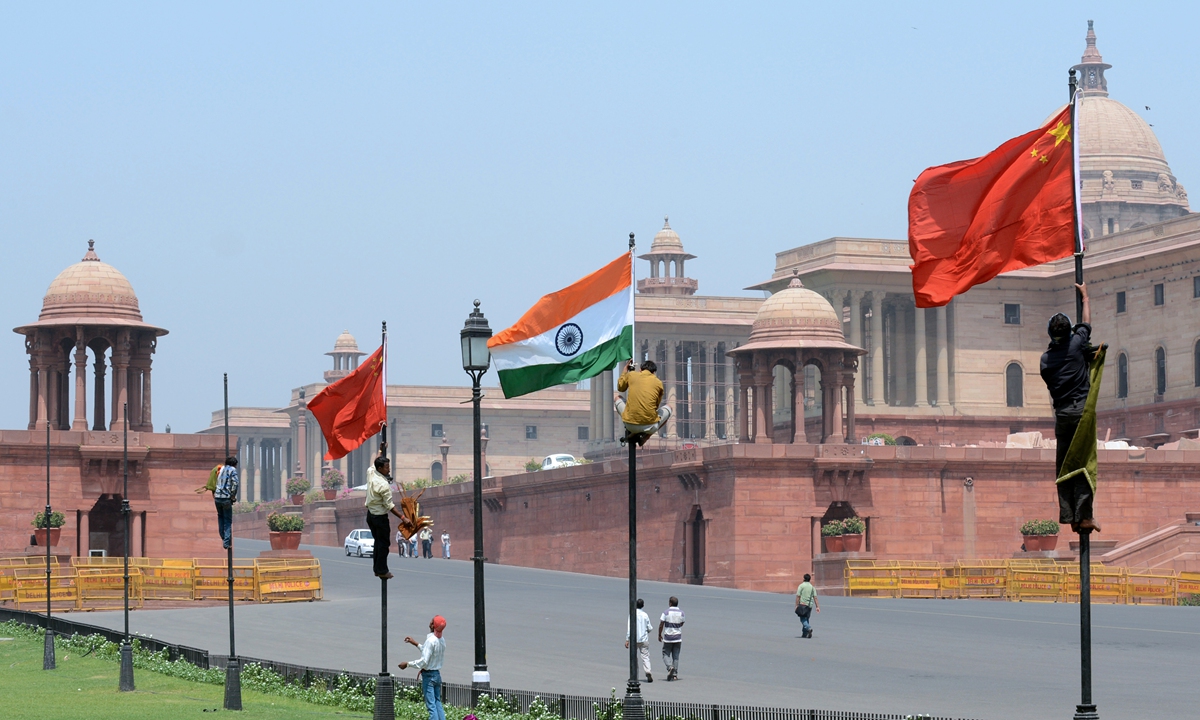Diplomats, military work to cool tension
By Zhang Hui and Guo Yuandan Source:Global Times Published: 2020/6/23 22:13:40
Chinese, Indian defense ministers 'likely' to meet in Moscow

Indian workers tie Indian and Chinese national flags onto poles in front of The Indian Secretariat in New Delhi. Photo: AFP
Recent frequent communications between China and India through both military and diplomatic channels show that the two sides, which have a mature mechanism to resolve border disputes, are willing to de-escalate tensions after the June 15 clash, Chinese analysts said.
However, some analysts said it's possible that India may provoke more trouble in border areas in July, as it has broken its promises once and could do so a second time. Although stirring up a war is unlikely, Chinese border troops must prepare for the worst-case scenario.
The border troops of China and India held their second commander-level meeting on Monday, the first such meeting since the June 15 clash, which showed that both sides wish to properly handle differences through dialogue and consultation and ease the situation, Chinese Foreign Ministry spokesperson Zhao Lijian said during Tuesday's media briefing.
Both sides exchanged views on the prominent problems in border control at present, and they agreed to take measures to de-escalate the situation and conduct more discussions to promote peace in the border areas, Zhao said.
On Tuesday, Chinese Foreign Minister Wang Yi, Russian Foreign Minister Sergei Lavrov and Indian External Affairs Minister S. Jaishankar attended the China-Russia-India trilateral foreign ministers' video meeting.
Wang said in the trilateral meeting that China, Russia and India, as three major countries of strategic independence, should pursue their common interests of promoting their development and safeguarding world peace and development, correctly handle sensitive factors in bilateral relations, and maintain overall bilateral relations.
The Global Times has learned that Chinese Defense Minister Wei Fenghe will attend the Victory Day parade in Moscow on Wednesday, and the Indian Defense Minister arrived in Moscow on Monday.
It's highly likely that the two senior military officials will have either official or unofficial bilateral talks in Moscow, and this will cool down the tense situation and show that the two sides are working to avoid intensified conflicts or even a war in the border areas, Qian Feng, director of the research department at the National Strategy Institute at Tsinghua University in Beijing, told the Global Times on Tuesday.
He said that frequent communication between China and India showed that the two countries are willing to resolve border problems through peaceful means.
"Diplomatic and military channels are two parallel ways, as diplomatic means could help cool down the situation at the strategic level, while military talks focus on ground-level and detailed plans," Qian said.
But to solve the border issue, China and India need more talks to reach detailed agreements, Qian said.
Qian said that China and India should work together to restore peace, as the Indian side should stop its construction activities along the LAC.
Prior to Monday's commander-level meeting, border troops of China and India held their first commander-level meeting on June 6, during which the Indian side promised that it would not cross the estuary of the Galwan River to patrol and build facilities.
But India, which tried to divert domestic attention from the government's incompetence in handling the COVID-19 and its economic slide, broke its promises and unilaterally stirred up trouble less than 10 days after the first meeting, Hu Zhiyong, a research fellow at the Institute of International Relations of the Shanghai Academy of Social Sciences, told the Global Times on Tuesday.
He said that if the Indian government fails to contain the epidemic in July, the Indian side may provoke more trouble in the China-India border regions next month, as well as other border areas with countries including Nepal and Pakistan, Hu said.
RELATED ARTICLES:
Posted in: DIPLOMACY